- Home
- Neal Asher
The Line of Polity Page 6
The Line of Polity Read online
Page 6
‘I got some good stuff that ain’t on display, my friend,’ said the owner of the hand.
Skellor studied her: she looked of a type – those who bought passage to new worlds, then couldn’t be bothered to work hard enough to make a decent life for themselves, or to raise enough money to move on. Her cosmetic work was out of date, her clothing shabby, and she had that look of perpetual anger at circumstances she did nothing to correct.
‘Like what?’ he asked.
Quickly she pulled three plastic cartons from under the table and opened them on its surface. The first carton contained artificial gemstones suitably adulterated to make them look like the real thing, the second contained a selection of augs of the type that would scramble your brains within a week, and the third contained a grey egg and a bag of broken coral.
‘See,’ she said, holding up a Sensic augmentation.
Skellor turned to go, but then allowed his attention to stray back to the third carton.
Where had he seen coral like that before?
‘What’s that?’ he asked, pointing.
She picked up the bag and shook it. ‘This is real coral, from the Barrier Reef on Earth.’
‘How interesting,’ said Skellor, knowing that the chances of stealing coral from that place were equatable with the chances of beating the Earth Central AI at chess. Again about to turn and leave, he remembered where he had before seen coralline objects such as these. In the Tranquillity Museum on Earth’s moon: in a chainglass case inside a security chamber everyone was aware could be ejected from the Museum at a moment’s notice, to be obliterated in space by CTD – Contra Terrene Device – that euphemistic term for an antimatter weapon.
‘All right, how much do you want for them?’ he asked.
‘You have to buy the whole carton,’ she replied. ‘Twenty shillings.’
‘I don’t want that egg thing, so I’ll give you ten.’
Glancing at the purple swirl of cloud to the north, the woman agreed.
The node was changing colour and there seemed to be movement: interchange within the cubic patterns on its surface. A year of research had revealed to him that the coralline objects were certainly Jain, and certainly useless. Fifteen years of research had revealed perhaps one per cent of the secrets of the node, but enough to put him way ahead of any competitors in his field, and to give him an understanding of what he was dealing with. Tipping the object into the gloved palm of his hand, he raised it to his lips.
Then he pushed it into his mouth.
3
With the slightly bored tone of an adult who knew what was coming, the woman said, ‘The brother who had built his house from blocks of limestone and roofed it with slabs of the same, already knew the dangers of pride and, hearing that his friends had been eaten by the heroyne, he prayed for them.’ She glanced at the child in the hope that he had fallen asleep at last, and that she wouldn’t have to read the rest. One read-through was enough to get the heavy-handed message and, even though she had been told to persevere, she was contemplating dumping the damned book. The boy, unfortunately, was as wide-eyed as ever.
‘For his house was built with the stones of the Satagents, cemented with Faith, and the roof was tiled . . .’ She trailed off into silence when she realized that what she was saying bore no relation to the words the book displayed. Thinking that she must be getting ahead of herself, she started again:
‘But neither pride nor prayer have influence on the heroyne,’ she said, then leant forwards to more closely study the text.
‘I’m sure it didn’t say that yesterday,’ she muttered. Half closing the book, she was surprised to see that the title of Moral Fables had just acquired a ‘t’ and changed to Mortal Fables.
‘Mum?’ said the boy impatiently.
‘Naughty,’ she said with a grin, as she opened the book again.
The boy gave her a puzzled look, but she continued reading:
‘For it came to stand over his house that night, as he prayed to his god. Then it huffed and it puffed, it puffed and it huffed, then it kicked down his walls.’
The boy looked even more puzzled at this.
‘What do you think the last brother said to the heroyne when his house was gone?’
On more familiar territory now the boy replied, ‘Don’t eat me!’
‘And let’s see you make a stab at guessing what it did do.’
The boy gave the usual reply whilst the heroyne in the picture book repeatedly gobbled down a man in priestly attire . . .
It started after the first sleep period, when the clans came groggily from, in most cases, drugged slumber. Apis had woken before most of the others. Yes, the destruction of the station was terrible, but it was also the most exhilarating thing that had happened to him. His mother woke shortly after, and studied him speculatively as he gazed at the other clan members rising and beginning to move about. No one had an individual cabin. They were in a huge hold, and what privacy they had was provided by plastic sheeting easily suspended in low gee – probably created by slow acceleration of the ship rather than any grav-tech, as Peerswarf informed him.
‘Go and find a food dispenser,’ his mother ordered him, and he quickly went, not being inclined to disobey when her voice took on that tone. Apis soon found a machine set in the wall, and collected a ration of food bars and a container of some sort of hot drink – there had been no labels on the machine. He was on his way back when he heard the uproar. Immediately curious, he went over to investigate.
Two full-gee men stood uncomfortably by doors at the back of the bay. There was something quite odd about their identical dress: they wore white shipsuits that appeared to be padded and armoured, and down one side from armpit to ankle were words in no language Apis understood. They wore visored helmets that armoured one side of their faces, and joined to a ring of the same white metal around their necks. On the exposed sides of their heads they each wore scaled augs with an organic appearance. They both also carried weapons of some kind. Apis realized that these men wore military uniforms – but no Polity uniform that he recognized.
‘We want five of you – now,’ one of the men said, his voice seeming almost disinterested.
The rousing Outlinkers ignored what he had just said, and bombarded him and his comrade with questions. Apis glanced aside and saw that several other Outlinkers were standing back with their heads bowed and fingers pressed to their own augs – none of which had the organic appearance of those worn by the guards. They all bore expressions of puzzlement.
‘Nothing,’ said the old man standing next to him. ‘I’m getting nothing.’
As the questioning grew more insistent, the Outlinkers drew closer to the two soldiers, who simply seemed puzzled by this behaviour. Apis did not see or hear what initiated action. All he saw was the soldier – who had not spoken – swing his weapon, and all he heard was the sickening crunch of breaking bone. The crowd parted around a clanswoman falling slow, and foetal, to the floor. Afterwards, there was silence.
‘We want five of you,’ said the speaker, in that same disinterested tone, and the Outlinkers began to move away. ‘Now,’ the man added, pointing his weapon at the crowd for emphasis. One of the crowd stepped forward. It was Peerswarf, the man Apis liked to think was his father.
‘We demand you let us speak with the ship AI. This is intolerable. Are we animals to be treated like this?’ Peerswarf watched as others tended to the woman. There was an expression of disbelief on his face. Apis stared at the woman, and saw that her skull had a cavity and she was not breathing. It seemed that no one wanted to admit she was dead.
The speaker raised his tinted visor and gazed at Peer-swarf. Now a sneer twisted the soldier’s features.
‘We do not allow idiot silicon to order our lives. There is no AI on this ship. Under God, men fly it, men control it, men operate the guns.’
Silence of shock, more profound than the assault had caused, met this statement.
‘She is dead,’ said one of thos
e who had stooped down to the woman.
Peerswarf glanced down at him as if he had said something illogical, then he returned his attention to the soldiers.
‘You killed her . . .’
‘Yes, and more will be killed if five of you do not come with me now.’
‘What . . . what for?’
‘We need five able hands to work in the engine room.’
‘Engine room?’
Since when had anyone worked in the engine room of a ship? Automatics handled such things. Robots normally did the work in such places.
‘Now!’ yelled the soldier, and with that raised his weapon upwards and pulled the trigger. There was a low thrumming and something crackled across the ceiling. Apis heard the caroming of ricochets, and noted the line of dents in the metal. Rail-gun, primitive.
Hesitantly at first, several Outlinkers stepped forward, to be directed through the doors. More soldiers waited beyond. Apis turned to hurry back to his mother, but she was already standing at his shoulder. They gazed at each other but they did not speak. Later, when the five returned, dirty, tired, and with the radiation tags on their belts into amber, they exchanged that gaze again. All their lives they’d had information access. They now knew the score: they were in the hands of barbarians.
‘I am Deacon Chaisu of the warship General Patten,’ the face on the screen informed them later on. ‘It is unfortunate that a member of your group was killed today – may she rest in the arms of our Lord – but it must be understood that you are indebted for your lives to the people and planet of Masada and to the God of the Faithful. A small portion of this debt can be cancelled by your work upon this ship, and finally in the yards on Flint . . .’ The Deacon went on and on about the wonderful things they could do, and the projects in which they might become involved. He then told them they were the defenders of humanity.
‘Perhaps you are unaware of what caused the destruction of Outlink station Miranda . . . Some of you may know the story of the system of Aster Colora, some of you may know of the more recent events on the way-station world of Samarkand. On the latter world, thousands of people were killed by the transgalactic servant of Satan that names itself Dragon. It used a nanomycelium to destroy the buffers of an interstellar runcible so that a man arrived on Samarkand as photonic matter. His arrival was the cause of a fusion explosion that killed many. Many more died in the aftermath, for Samarkand was a cold world heated by energy build-ups from the runcible. The rest of the population froze to death. Know now that the nanomycelium used to destroy Miranda was the same one – that Dragon destroyed your home. You must work now to . . .’
So it went on and, each time they thought it had finished with a ‘God defend the faithful’, Deacon Chaisu would start up again.
‘Propaganda officer,’ said someone nearby.
‘They’re religious,’ observed Apis’s mother.
‘So?’ asked the speaker.
‘They believe their own propaganda. It’s where the word originates,’ she replied knowledgeably.
Apis asked, ‘What is going on?’
‘There is an old word for what we are to become,’ said the man nearby.
‘What is that?’ asked Apis.
‘Slaves,’ his mother told him.
The sprawns were the blue of tool steel and over ten centimetres long. Their wings made it necessary for nets to be stretched across their ponds at all times, to prevent them flying off to die in an environment hostile to them. As Eldene understood it, they were another expensive delicacy destined both for the tables of the Theocracy and for them to trade in exchange for luxury goods from other worlds.
‘They say these are an adaptation from an Earth creature,’ Fethan said as he and Eldene laboured at digging a sluice ditch leading to one of the ponds.
‘I might like to believe your stories about the Underground, but I don’t believe the ones about Earth, old man,’ Eldene replied.
‘Why not?’ Fethan sounded hurt, as he shovelled out another clump of black mud.
Eldene watched the nest of green nematodes the old man had uprooted, as they writhed and burrowed back into darkness. ‘The great mythical empire where everyone is free and everyone has their portion of plenty. I know the difference between what’s possible and what’s wishful thinking. If this Earth even exists, it’s far from here and not doing anything to help us. And as for this Human Polity run by godlike AIs . . .’ She snorted and shovelled more mud.
‘But it’s true,’ Fethan protested.
‘Oh yes, then why aren’t there Polity ships amongst the traders?’
‘How do you know there are not?’ Fethan asked.
‘Well, if some of them are Polity, they seem glad enough to buy refined squerm and sprawn essence,’ Eldene spat, thinking of the buyers the Vicar of Cyprian Compound sometimes brought out on tour, who did not seem overly bothered by the penitential lot of the pond worker.
Fethan said, ‘Most of ’em are scum of the Line.’
‘Yes, and I’m a gabbleduck’s mother,’ said Eldene. And there the conversation ended, as it was drowned out by the racket of Volus’s aerofan landing nearby. Now silent, the two of them dug their way closer and closer to the heavy iron sluice gate across which they must fit nets before draining the pond. Before they reached the gate, a shriek had them peering over the edge of the ditch.
‘That’s where Cathol and Dent are digging!’ shouted Fethan.
Eldene glanced round and was surprised to see the old man nimbly leap out of the ditch and head in the direction of the sound. Upon tiredly following the old man, she saw Volus standing over by the sluice that the other two had been digging, with Dent sprawled at his feet. The rattling of sprawn wings filled the air, the strange creatures having escaped through the sluice and uncovered ditch. Eldene quickly followed Fethan who seemed, surprisingly, intent on finding out what was going on. Soon they arrived at the side of the ditch, only to see Cathol trapped underwater beneath the collapsed sluice gate, sprawns swarming in the water all around him.
‘He’s . . . going to . . . kill . . . us,’ Dent managed to gasp from where he lay at the Proctor’s feet.
‘Get back to work, brothers,’ said Volus, turning round from his cold studying of Cathol.
The worker, Cathol, looked dead to Eldene, but it seemed unlikely that the collapsing gate would have killed him or his scole, and his scole would have prevented him from drowning. She could only think, then, about what Fethan had told her the night before, and assume this to be murder. With no idea what she intended, she took a step forward. Volus whipped his stinger across, hitting her arm and then her scole, and she went down with a yell, the entire side of her body feeling as if dipped in acid, and her scole jerking against her. Crawling along the ground, she saw Volus draw his gun, point down, and casually shoot Dent dead. The man slammed face-down, his head opened, and its contents spattered across the black loam. Gasping, and beginning to black out from both pain and oxygen starvation, Eldene stared at Fethan and willed him to run.
Fethan stared straight back at her. ‘You know,’ murmured the old man, ‘there’s only so much undercover work I can stand.’ Then he walked towards the Proctor, jerking but not falling as two shots slammed into his chest, then halted, and speared his hand straight through the man’s body.
Twenty of the Outlinkers had their radiation tags into amber when, with a terrifying wrenching feeling of dislocation, the General Patten dropped out of U-space. Over the intercom, the speechifying continued, but they had all, after the first repetition, learned to ignore it. The twenty told of the primitive conditions, the lack of automatics, the weaponry openly carried, the radiation leaking into the engine hold. On the face of it, their situation seemed quite clear, yet some aspects Apis found confusing.
‘They called AI “idiot silicon” – like Separatists would – yet they are auged,’ he said to his mother.
Peerswarf, who had come over to share food and conversation with them, smiled and nodded at Apis, then said
, ‘Looks like biotech to me, so, as such, it’s definitely not silicon. Anyway, they “do not allow it to govern their lives” which is not to say that they will not govern it.’
How plausible all that sounded, yet Apis picked up on the worried look flashed between Peerswarf and Apis’s mother, and he knew that plausibility did not make truth. He listened to further discussion of the augs these people wore – how there was absolutely no connection to be made with those the clans wore – but in the end sleep became more important to him than eliciting whatever truth there might be, and he turned towards his hammock. He was just resting his hand on the edge of it, ready to pull himself in when a surge of gee threw him to the floor, then slid him against a wall. There was a crash, followed by pressure on his chest.
‘Fast manoeuvring,’ someone gasped. ‘An AI would have compensated.’
A siren started wailing and red lights strobed in the ceiling above the bay’s inner doors. Another crash. The ship shuddered.
‘Oh no,’ someone said, quite simply; there was terror and fatalism in the voice. Apis looked round and realized it was his mother who had spoken. She was staring at the ceiling. He looked up also, and immediately saw how the metal was twisting across its entire length.
‘What do we do?’ he asked her.
Another crash . . . the ship slewing sideways . . . people’s belongings flying through the air. His mother tilted her head to listen to the distant sounds of distorting and shattering metal, screaming, explosions.

 The Bosch: A Novella (Polity Universe)
The Bosch: A Novella (Polity Universe)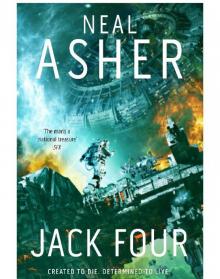 Jack Four
Jack Four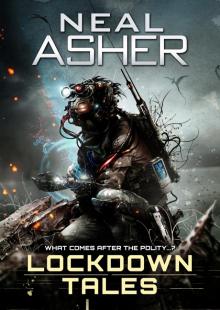 Lockdown Tales
Lockdown Tales The Warship
The Warship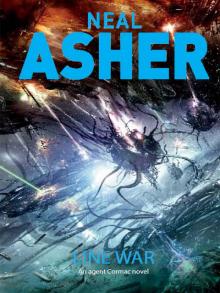 Line War
Line War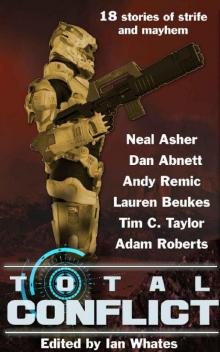 Total Conflict
Total Conflict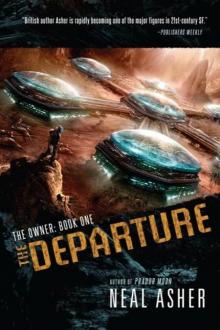 The Departure
The Departure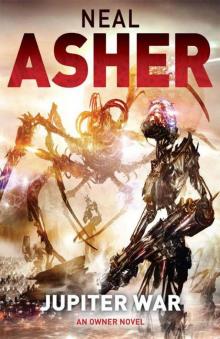 Owner 03 - Jupiter War
Owner 03 - Jupiter War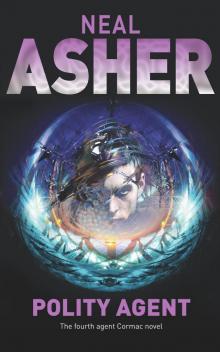 Polity Agent
Polity Agent Prador Moon
Prador Moon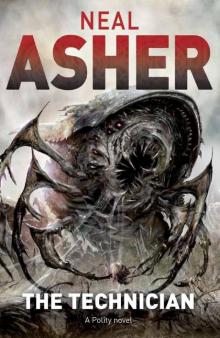 The Technician
The Technician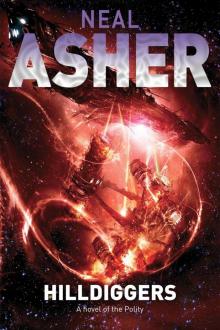 Hilldiggers
Hilldiggers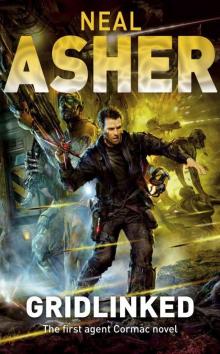 Gridlinked
Gridlinked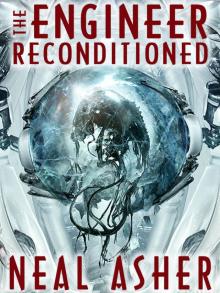 The Engineer ReConditioned
The Engineer ReConditioned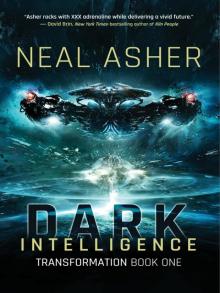 Dark Intelligence
Dark Intelligence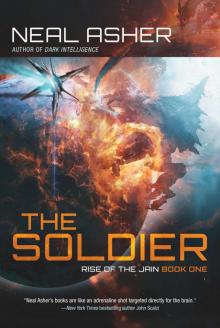 The Soldier: Rise of the Jain, Book One
The Soldier: Rise of the Jain, Book One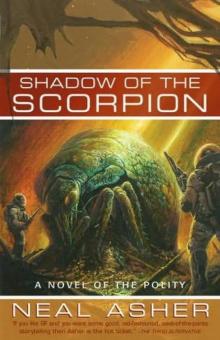 Shadow of the Scorpion p-2
Shadow of the Scorpion p-2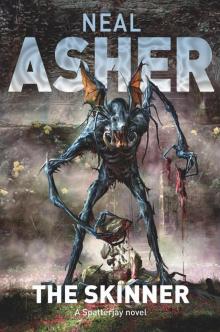 The Skinner
The Skinner The Soldier
The Soldier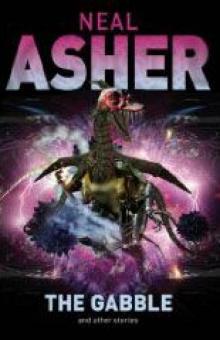 The Gabble p-13
The Gabble p-13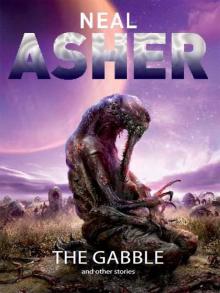 The Gabble and Other Stories
The Gabble and Other Stories The Parasite
The Parasite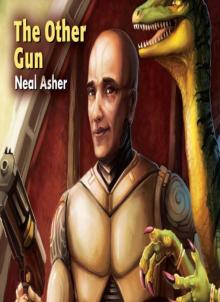 The Other Gun
The Other Gun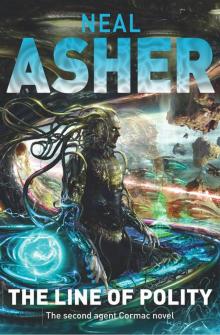 The Line of Polity
The Line of Polity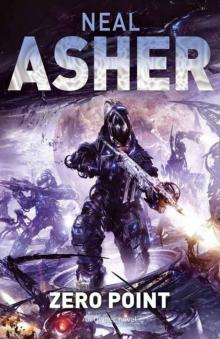 Zero Point (Owner Trilogy 2)
Zero Point (Owner Trilogy 2)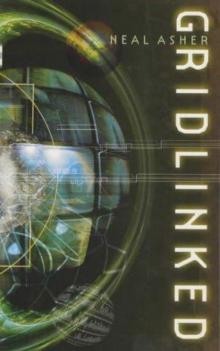 Gridlinked ac-1
Gridlinked ac-1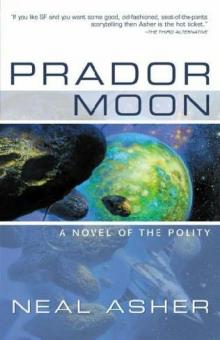 Prador Moon p-1
Prador Moon p-1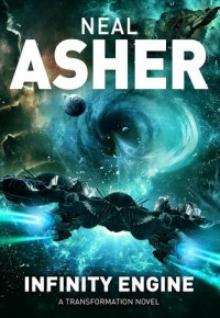 Infinity Engine
Infinity Engine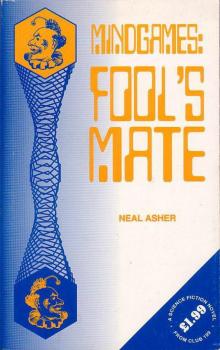 Mindgames: Fool's Mate
Mindgames: Fool's Mate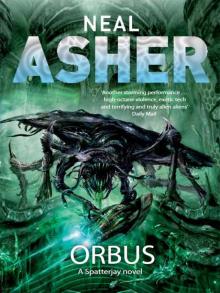 Orbus
Orbus Africa Zero
Africa Zero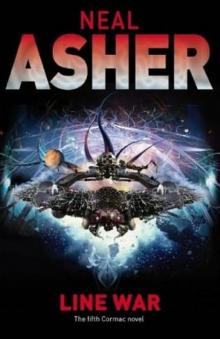 Line War ac-5
Line War ac-5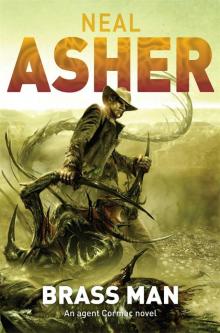 Brass Man
Brass Man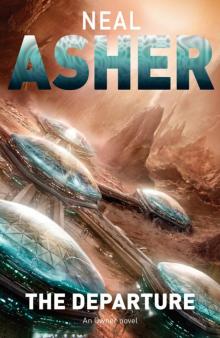 The Departure to-1
The Departure to-1 Cowl
Cowl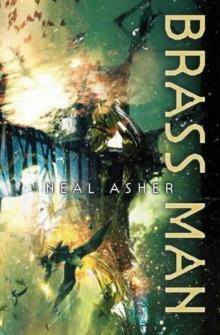 Brass Man ac-3
Brass Man ac-3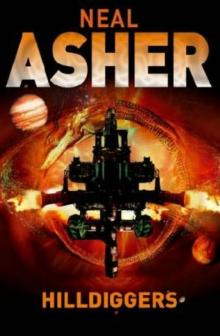 Hilldiggers (polity)
Hilldiggers (polity)![Greg Bear - [Eon Trilogy 1] - Eon (rescan) (v1.0) Read online](http://i1.bookreadfree.com/i2/04/08/greg_bear_-_eon_trilogy_1_-_eon_rescan_v1_0_preview.jpg) Greg Bear - [Eon Trilogy 1] - Eon (rescan) (v1.0)
Greg Bear - [Eon Trilogy 1] - Eon (rescan) (v1.0)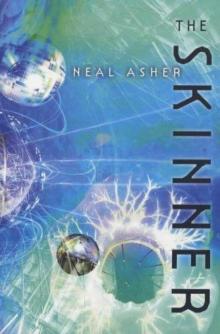 The Skinner s-1
The Skinner s-1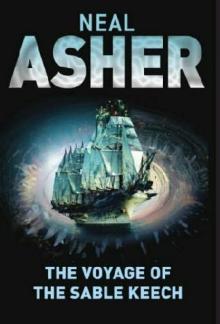 The Voyage of the Sable Keech s-2
The Voyage of the Sable Keech s-2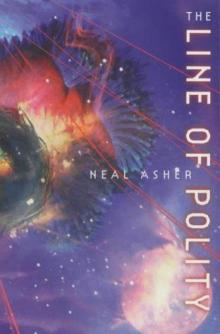 The Line of Polity ac-2
The Line of Polity ac-2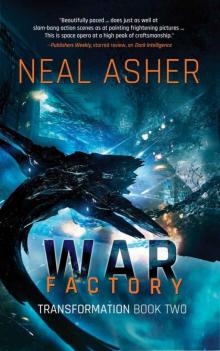 War Factory: Transformations Book Two
War Factory: Transformations Book Two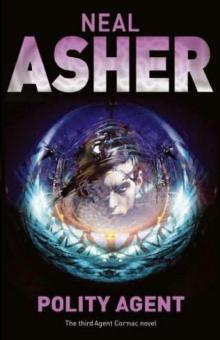 Polity Agent ac-4
Polity Agent ac-4